Peter MALONE
Saturday, 09 October 2021 13:01
Primal/ 2019
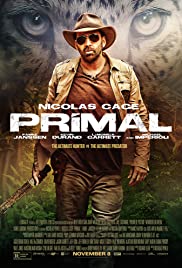
PRIMAL
US, 2019, 97 minutes, Colour.
Nicolas Cage, Famke Janssen, Kevin Durand, Jeremy Nazario, Michael Imperioli.
Directed by Nicholas Powell.
This is very much a film for Nicolas Cage fans – and for those interested in hunting of exotic animals in the jungles destined for zoos, for an action show. It was directed by Nicholas Powell who has over 150 credits over several decades for stunt work.
The film opens in the jungles of Brazil, Nicolas Cage is Frank perched on a stand, with animal bait for a Jaguar, a white Jaguar which he traps, along with other animals.
The main action of the film takes place on the ship sailing back to the United States. He meets military personnel who are accompanying a hired assassin, Kevin Durand, back to the United States. He is military trained, claims he was killing on behalf of the American government. Famke Janssen and Michael Imperioli are the officers in charge of him (and a terrible distraction throughout the film is Famke Janssen’s face, looking like a mask rather than skin and complexion).
Needless to say, the prisoner escapes, a big tall man, ruthless, eliminating many of the crew, taking charge of the ship, turning it around. There is some resistance from members of the crew and some ambiguous behaviour on the part of the official played by Imperioli. And, again needless to say, some of the animals get loose, there are threats to the life of one of the crew, his teenage son in peril,
Most of the time, with the many fights, the assassin towering over Nicolas Cage, Cage is frequently bashed, some brutal encounters. We can guess that the white Jaguar is going to come into action for the climax of the film, the assassin trapped, hanging upside down, target for the Jaguar.
A time-passer for those who like action shows and for those who enjoy the many, many Nicolas Cage action films each year.
Published in Movie Reviews
Published in
Movie Reviews
Saturday, 09 October 2021 13:01
Tell No One/ Ne le dis personne
.jpg)
TELL NO ONE (NE LE DIS A PERSONNE)
France, 2006, 131 minutes, Colour.
François Cluzet, Marie- Josee Croze, Andre Dusollier, Kristin Scott Thomas, François Berleand, Nathalie Baye, Jean Rochefort, Marina Hands, Gilles Lelouche, Philippe Lefebfre, Guillaume Canet.
Directed by. Guillaume Canet.
Tell No One is based on a best-seller by Harlan Coben. This reviewer confesses that Coben is one of his favourite authors. Not only does he construct intricate plots for his thrillers, he also writes tantalisingly enjoyable prose with a gift of the entertainingly incongruous metaphors, often from modern pop culture.
So, what is a writer whose stories generally take place in New Jersey doing with a French film. Guillaume Canet is a popular young French and international actor (The Beach) who was fascinated with the novel and decided to adapt it with his writing partner, Pbilippe Lefebvre, and set it in France. The adaptation works very well. (Harlan Coburn is alleged to have said that the ending is better than his original.)
The film has received critical acclaim and has won four French Cesars (including best actor and direction) and has also proven popular.
When the wife of a doctor is murdered, the doctor is initially thought to be the killer. But he himself was attacked and has little memory of what happened. Eight years later, some bodies are discovered in the area and he comes under suspicion again. He then receives an email message and some streaming video which suggests that his wife is still alive.
The writers keep Coben’s characters – quite a large cast – and the steps of his plot as more and more complexities are revealed. In fact, the cast is most impressive. Francois Cluzet is excellent as the harassed doctor, with Marie-Jose? Crozee as his wife. Character actors include veterans Nathalie Baye as a lawyer, Jean Rochefort as a business tycoon, Kristin Scott Thomas as a friend. Cauet has cast himself as a very nasty type who is killed.
Just as American adaptations of French films (and there are many) Americanise them (and are harshly criticised for this), so the French have Frenchified (or Gallicised) the American story – and are being highly praised for it!
Interesting, entertaining and substantial.
1. The popularity of the original American novel? Transfer to France, characters, situations, locations, spirit?
2. The strong cast, the many awards?
3. A popular thriller? Innocent victim, persecuted and pursued, trying to unravel the mystery? The law, police, lawyers?
4. Alex’s story, successful doctor, the murder of his wife, eight years later, his success? Contact from his alleged dead wife, email, streaming video? The continued pursuit, the attack on his friends, the murder of Charlotte, his being suspected of this murder? His sister, support, Helene, hiring the lawyer, the work of the lawyer?
5. Margot, her disappearance, the email contact? Her seeming to go to bonus ironies?
6. Alex on the run, the murder of Charlotte, circumstances against him? The encounters with Bruno, his gangster background, his help, rescuing Alex?
7. Elizabeth, her work, evidence?
8. Margot’s father, the revelation that he faked her death? The bruises, the photos? His motivations?
9. Philippe Neuville, criminal background, paedophilia, Margot confronting him? His attack on her? His father, protection, the law?
10. The events in the past, Margot’s father, confronting Philippe, Philippe’s father? The shooting? Philippe’s death?
11. Margot’s father, the confession to Alex? Knowing that Alex was wearing a wire? His revelation that he did not shoot Philippe but that Margot did and he was protecting her? His killing himself?
12. Philippe’s father, interventions, his death?
13. A happy ending after all the deceptions?
Published in Movie Reviews
Published in
Movie Reviews
Saturday, 09 October 2021 13:01
Agatha Christie's Poirot Murder on the Orient Express
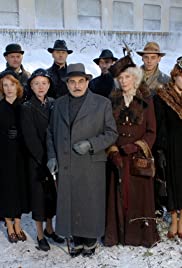
MURDER ON THE ORIENT EXPRESS
UK, 2010, 93 minutes, Colour.
David Suchet, Jessica Chastain, David Morrisey, Hugh Bonneville, Barbara Hershey, Eileen Atkins, Samuel West, Sam Crane, Toby Jones, Brian J.Smith, Serge Hazanavicius, Susanne Lothar, Dennis Menochet, Marie- Jose Croze, Joseph Mawle.
Directed by Philip Martin.
There have been several versions for film and television of this celebrated novel by Agatha Christie. This is the contribution to the television series with David Suc as Pohetirot. It was made 21 years after the series began, Poirot now ageing. He is also more indignant in this film, especially about applications of the law and justice. There is also an emphasis on his Catholicism, praying, the rosary, thanking God that he was born a Catholic, his prayers at the end. These themes were recapitulated in the final story, Curtain.
The celebrated version was the 1974 film with Albert Finney as Poirot and a star-studied cast embodying the passengers on the Orient Express. There was a 2017 version, directed by Kenneth Branagh, with Branagh himself as Poirot (and a very long moustache), also with a star studied cast but not having the opportunity to develop their characters as in the previous film. Bloggers at the time of this version were not very happy with the screenwriter’s interpretation and treatment of the plot, writing critical reviews.
As with the 2017 version, there is a prologue with Poirot investigating justice in Palestine. He boards the Orient Express in Istanbul, after observing the stoning of an adulterous woman in the street, difficulties in finding a compartment for him. The train runs through the Asian and Central European countryside, eventually snowed in.
Toby Jones appears as the murder target, obnoxiously American, revealed to be an abductor, murder of a little girl, Mafia connections, Brian J.Smith and Hugh Bonneville as his assistants. (The kidnapping aspects of the plot parallel the Lindbergh Kidnapping case.) Dennis Menochet is the train guard, Eileen Atkins is the Russian Countess with Susan Lothar as her maid, Barbara Hershey is the period imperious American matron, Samuel West is the doctor, a good role for Jessica Chastain as Mary Debenham, partnered with David Morrisey as a former military man.
By 2010, certainly by 2017, most potential audiences of this Agatha Christie story would know the ingenious solution, that they all did it.
1. One of the later films on the television series of Agatha Christie mysteries? With David Suchet as Poirot? Getting older?
2. The classic status of the novel? The intricacies? The plot? The victim and the murderers?
3. The opening, Poirot indignant, in Palestine, the court case, the soldier, the accusations, his killing himself? The soldier trying to justify the mistake? Poirot and his severe attitudes towards the law?
4. In Istanbul, in the streets, watching the woman chased by the crowd, stoned for adultery, John Arbuthnot and Mary Debenham, her protest? Poirot observing? Issues of the law, culture and justice?
5. The hotel, Poirot summoned back to England, the head of the line, arranging his passage, at the station, the train full? The discussions with Michel? Finding a place for Poirot? Sharing with Mac Queen, the inconvenience?
6. The range of passengers, disparate, the number of women, the men? Ratchett, rough and rude, demanding, Mac Queen working for him, Edward Masterman, at his beck and call? Is propositioning? Poirot observing? His approaching Poirot to investigate his case, paying the money, more money? Poirot refusing? The intercutting of Ratchet and his praying for forgiveness? With Poirot, his rosary, glad to be a Catholic?
7. Movement during the night, the progress of the train through the snow, stopping at the station, Poirot getting a new compartment? Observing, the people in the corridor? The cry out in the night?
8. The morning, the intrusion into his compartment, the urgency, Ratchet dead, the blood? Dr Constantine and his attentions? Speculating about the stab wounds, the murderer leaving through the window? (No footprints in the snow). Poirot, examining the body, the different angles of wounds, the different strength, the burnt paper and his experiment to read the words, the handkerchief with the initial? The button from the uniform?
9. The identity of the murdered man, gangster, the abduction of the little girl, his killing her? The judge paid off and his getting free? The family of the girl, her actress mother, her sister, her friends, the nanny, the cook, the chauffeur? The maid accused of the murder, her suicide, her grieving husband?
10. The passengers on the train, their identities? Poirot gradually making the links of all of them with the family? The Countess and the long friendship, her Russian vindictiveness, the irony of the money in her dress? Her maid, German, the cook? The French woman and her piety, finding God? The count and his wife, her signature? Arbuthnot and Masterson in the Army with the husband of the girl? Mary Debenham, her relationship with Arbuthnot, the issue of the divorce proceedings being over? Dr Constantine as the obstetrician? Mac Queen as the son of the judge in the case?
11. The reconstruction of the event? The victim, drug, conscious as he was stabbed, seeing all those killing him, their motivations, angers, strength and force? Snowed in, altering the plan, the murderer to go through the window, through the mother’s compartment, her story, finding the knife?
12. Poirot, standing in judgement? His severity of attitude? The law, justice? The various members pleading with him, explaining their motivation, failed by the law? The decision, legally justified, religiously justified? Mary Debenham and her plea to Poirot? The theory that it was a murderer who disguised himself as a steward on the train? The uniform, the
button?
13. The manager of the line, assisting Poirot in his investigations? The local police arriving? Poirot and his decision, the theory of the killer disguised, handing over the uniform?
14. Poirot at the end, praying his rosary, his conscience and justice?
Published in Movie Reviews
Published in
Movie Reviews
Saturday, 09 October 2021 13:01
Agatha Christie's Poirot Hallowe'en Party
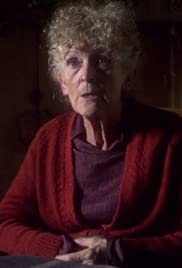
HALLOWE'EN PARTY
UK, 2010, 93 minutes, Colour.
David Suchet, Zoe Wanamaker, Deborah Findlay, Julian Rhind- Tutt, Amelia Bullmore, Mary Higgins, Sophie Thompson, Georgia King, Ian Hallard, Timothy West, Fenella Woolgar, Macy Nyman, Richard Breislin, David Yelland, Paul Thornley, Eric Sykes, Phyllida Law, Vera Filatova.
Directed by Charles Palmer.
This is one of the later feature films in the television series of Agatha Christie mysteries with David Suchet as Poirot. The novel was published in the late 1960s and draws on the American traditions of Halloween which, at that time, were not so well-known or used in the United Kingdom.
Rather than exotic locations (although there is a mention of Athens), this mystery is firmly focused in a village, the setting is confined to a home, a mansion, the stylised garden, the local church, the woods.
At a Halloween party while the children are playing, a young girl boasts that she has seen a murder. She is then found murdered herself. The local police, initially not very sympathetic to Poirot, think that it was a passing stranger. Mrs Ariadne Oliver, played again by Zoe Wanamaker, is present at the games, confined to bed later with a cold, make your usual humorous comments, especially puzzling about the solution to her latest murder mystery.
Poirot suggests that it is important to look at the victims and their stories which will lead to the solution of their murders. The housekeeper to the local minister (Timothy West) gives Poirot the list of those who have died – and there is investigation as to each of the three deaths, one ultimately a suicide, two probable murders.
As always, there is a range of suspects, the hostess of the party, Deborah Findlay in a powerful performance as Mrs Drake, the neighbour and her daughter, the organist at the church, Mrs Drake’s son and daughter. Poirot meets on the train coming to the village, a gardener, Michael Garfield (Julian Rhind-Tutt) who becomes much more involved.
In fact, the plot is quite complicated, and not just one killer but two collaborating.
The screenplay was adapted by actor-writer, Mark Gattis, who also adapted Cat among the Pigeons, writing a number of the episodes of Sherlock with Benedict Cumberbatch (where he himself played Mycroft Holmes).
1. The popularity of Agatha Christie mysteries? The television series? With David Suchet as Poirot?
2. A later Agatha Christie novel? From 1969? The presence of Halloween celebrations in the UK? The American traditions? Costumes? Trick or treat?
3. The English village setting, the house, the woods, the stylised garden? The musical score?
4. The setting, the people from the village, the children and the games, the adults? Mrs Drake hosting and commanding? Her son and daughter? Judith Butler and Miranda? Reverend Cottrell and his participation? The spirit? The American tradition? In an English village?
5. Joyce, her age, telling stories, claiming to have seen a murder, not recognising it till later? Her being disbelieved? Ignored? Discovered dead, drowned? Leopold, his not liking his sister? The relationship with their mother? Her resignation to God’s will? Discussions with Reverend Cottrell?
6. The discovery of the body? The police inspector, thinking it was a stranger? His reaction to Poirot? The mystery with the next murder? His asking for Poirot’s collaboration? The documents and the forgery of the codicil?
7. The presence of Ariadne Oliver? Participating in the games? Her cold and taking to bed? The encounter with is Mrs Drake and the breaking of the vase? Phoning Poirot? Her presence, sharing in the investigations from bed? Her puzzles about her own novel and the solving of the mystery?
8. Poirot, the scene of the crime? The issue of whether there were many other deaths in the town? His visit to Mrs Goodbody (and her presence disguised as a witch at the party, and her not being liked)? The three deaths, the school teacher, Mrs Drake’s aunt, the young man? The flashbacks, the characters, and explanations?
9. Poirot on the train, the encounter with Michael Garfield, the pleasant conversations? Poirot’s admiration for his garden? Garfield, the older women disliking him? His presence in the garden, perfection, not many visitors? His background in witchcraft customs from the village?
10. Mrs Drake, commanding personality, hospitable, demanding, her disliking her son and daughter, the flirtatious daughter, the snobby son and his reading? Her interviews with Poirot? The episode with the broken vase? The alleged opening of the library door? Seeing Leopold?
11. Judith Butler, congenial, hosting Poirot, disliking Garfield? The love for her daughter and protecting her? Miranda, the touch of the fey, going out into the gardens? The encounter with Garfield, the story of the sacrifice? The revelation about his being her father?
12. Miss Whitaker, the playing the organ, presence in the church? Her presence at the games? The background story of her relationship with the teacher? The lesbian intimations? Her discovery of Leopold’s body, talking with Poirot, her sad memories, the teacher’s suicide and leaving the note? Miss Whitaker destroying the note so that the teacher could be buried in holy ground?
13. The lawyer, the documents, the aunt and her will, the codicil, her visit to Reverend Cottrell, Olga as her maid, leaving the house and property to her? Her disappearance, the Reverend Cottrell is mission, explanation to Poirot, his regrets?
14. Poirot and the solution? By going back to look at the victims and their stories?
15. The assembly, the explanation, Mrs Drake and her infatuation with Garfield, their plotting together, the murdered man and his forging the document? Are Getting the house and money? The murder of the young man? The killing of Olga? The story of Mrs Drake and the death of her husband? The shock for her son and daughter?
16. Garfield away in Athens, the situation at the party, Mrs Drake killing Joyce? Plotting with Garfield? The death of Leopold? The plan for the death of Miranda? Mrs Drake and her denials, her melodramatic emotional collapse, Garfield’s despising her?
17. The sadness of the deaths? Poirot walking with Judith and Mrs Oliver? The pumpkin? The Halloween story?
Published in Movie Reviews
Published in
Movie Reviews
Saturday, 09 October 2021 13:01
Indestructible Man, The
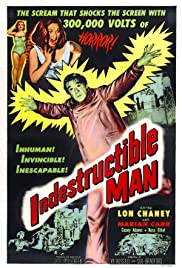
THE INDESTRUCTIBLE MAN
US, 1956, 71 minutes, Black-and-white.
Lon Chaney, Casey Adams, Marian Carr, Ross Elliott, Stuart Randall, Ken Terrell, Robert Shayne, Joe Flynn.
Directed by Jack Polexfen.
The title suggests a science-fiction film with touches of horror, popular titles at this time including invisible, transparent… And, in fact it is partly science-fiction, a killer condemned to execution, with the name Butcher Benton, is taken, in body snatcher 1950s style, by a scientist and his assistant who are experimenting with corpses, the electric charge bringing the dead man to life again, more powerful than he was, and killing the two scientists. He is impervious to guns and bullets. He then goes on a rampage to murder his lawyer and the two associates who turned state evidence against him.
All this is placed in the context of a familiar police investigation and pursuit. In fact, overall, despite the title, this is a fairly routine police story.
What makes it strong and, as some have said, despite its hyperbole with the neo-Frankenstein story and the routine of police procedures, it is a guilty pleasure, is the presence of Lon Chaney. Later in his career. His performance is a variation on his Lenny in the 1939 Of Mice and Men. (Chaney had already portrayed The Wolf Man, Son of Dracula, The Mummy, the Ghost of Frankenstein.) Is a giant presence, menace, many close-ups of his tormented eyes, and his being unable to speak after the electrocution procedure.
The film relies on a quite extensive voice-over, rather intrusive to modern tastes, spoken by the chief detective, played by Max Showalter with his screen name of Casey Adams. There is also a young woman, again the familiar story, from a country town, no family, screen test, not employed, responding to the advertisement for a burlesque show. Unintentionally, she becomes involved with The Butcher who leaves her a note as to where the money from a robbery was stowed, in the Los Angeles sewers. The note is taken by the crooked lawyer who sets up his associates to recoup the money.
However, the Butcher is on the loose, stealing a car, killing two police at a roadblock, tracking down the two associates and killing them, pursuing the lawyer who, in fear, tries to get himself arrested so that he would not be killed. In fear, he confesses everything to the police who then pursue the Butcher through the sewers, his exit which leads him to a huge power plant where, as we might expect, he is electrocuted and dies.
The action was filmed on location in Los Angeles, in the city streets, at the Angel Flight cable car, in old hotels with elaborate elevators.
For audiences who enjoy old B-budget films, a guilty pleasure.
Published in Movie Reviews
Published in
Movie Reviews
Saturday, 09 October 2021 13:01
Da 5 Bloods
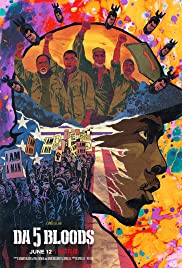
DA 5 BLOODS
Delroy Lindo, Jonathan Majors, Clarke Peters, Norman Lewis, Isiah Whitlock Jr, Melanie Thierry, Paul Walter Hauser, Jasper Paakkonen, Johnny Nguyen, Jean Reno, Chadwick Boseman.
Directed by Spike Lee.
Spike Lee has been a vigorous and outspoken film director since the middle of the 1980s. In 1989 his classic drama of Brooklyn, Do The Right Thing was released. During the 1990s he made a biography of Malcolm X with Denzel Washington. While he has made several fiction thrillers, he has continually returned in feature films and documentaries to race issues in the United States. He won an Oscar for Best Screenplay for his picture of the infiltration of the Ku Klux Klan by black policeman, BlacKkKlansmen?.
Da 5 Bloods has been a significant project for Lee for several years, to dramatise and explore the presence of African-American? soldiers in the Vietnam war. This is an ambitious film, running two and a half hours, set in the present with veterans returning to Vietnam to find the body of their fellow-Blood, Stormin’ Norman (Chadwick Boseman) as well as some gold, recovered from a plane and buried in Vietnam. In this context, there are many flashbacks to the Bloods, their camaraderie, seeing them in action, tension in various battles, encounters with the Vietcong.
And, for a wider circulation, and immediate circulation (especially in the times of covid-19), Da 5 Bloods was released on Netflix.
Immediate reaction by reviewers and, certainly, by a great number of bloggers, was unexpectedly negative. Some praise for spike Lee and his work, for good intentions, but not for the film itself.
It is not an easy film to watch. We immediately empathise with the ageing men returning to Vietnam, with all their memories, the reaction by the American public when the veterans returned from the war, their subsequent lives, traumas and achievements. The 5 certainly bond well together but each of them has quite a number of problems, most especially Paul (Delroy Lindo in an intense, at times a seemingly over-intense performance). Also joining the group is his alienated son, David (Jonathan Majors), meaning that there is the presence of the next generation, who did not experience the war, who do not have that intense attachment to the war experience.
There are scenes as they visit Saigon, somewhat overwhelmed, making comparisons with the past, David becoming involved with a French woman, one of the men revisiting his partner in the past and discovering his daughter. The men also hire a Vietnamese guide (with his own memories of his father in the war) so that they can find the location of the action, of Norman’s death, of the burial place of the gold. They also do negotiations with a shady French businessman, Jean Reno. This will lead to violence, to attacking locals, with their own memories of the war and conflict with the Americans.
The group also encounter the French woman who has a company for disposing of landmines – which also have some crucial dramatic moments for the Bloods.
While the film is dramatic, at many times it is highly melodramatic, especially as Paul manifests his traumas, his range of moods, his intensity for the gold (and one wonders whether Spike Lee has memories of the intensity of the gold hunt and discovery in John Huston’s classic 1948 The Treasure of the Sierra Madre).
One of the suggestions for appreciating Da 5 Bloods is to try to see the film from Spike Lee’s point of view rather than assuming what the audience might have wanted. Spike Lee is caught in his dilemma of wanting to do justice to the African Americans in war as well as critiquing the American government’s involvement in the war and the many disastrous consequences. Da 5 Bloods is certainly a film of conflict and contradictions, not intending for the audience to finish watching 2 ½ hours and feeling that they have completed a dramatic experience in understanding all the issues. The memories and the conflicts inevitably continue.
1. The work of Spike Lee? His perspectives? African- American? American racism? The presence of African- American soldiers in the Vietnam war? The aftermath?
2. The 21st century retrospective on the war, after 50 years? The contemporary settings? Vietnam in progress after the war? The American defeat? Vietnam’s place in the contemporary world? Unified? Yet the memories of collaboration in South Vietnam? The aggression of the Vietcong? The economic progress of the country, the development of Saigon into Ho Chi Minh City?
3. The title, the five men and their collaboration and camaraderie during the war? The death of Stormin’ Norman? Their admiration of him? The flashbacks, the war sequences, the dangers, the operations, military skills, the Vietcong attacks? Planes and helicopters? The gold on the plane? The attack, Norman’s death? The burying of the gold?
4. The decision to return to Vietnam, the four reuniting? The characters, their stories after the war, succeeding, failing, PTSD, financial difficulties, relationships? Paul and his son? Their motivation for returning to Vietnam, to meet one another again, to celebrate, to remember, to recover the gold, Norman’s body?
5. The visual technique for the present, widescreen, bright colour? For the flashbacks, different ratio, faded colour, footage of the times?
6. Paul is leader, strong personality, intentions, relationship with the other men, tensions, happy? His bringing his son? The difficulties with his son? David and his character, response to his father? Present on the expedition? In Saigon, at the bar, encountering the French girl, the relationship? His father’s resentment?
7. The other members of the group, their personalities, age? Financial success and failure? Race issues? The prostitute from the past, the soldier meeting her, discovering his daughter? The impact on him?
8. The device of having the aged actors playing their role of 50 years earlier, the effect on the audience? The continuity?
9. The contact with the Frenchman, shady deals, trusting him, his return, his Vietnamese allies, intentions with the gold? The confrontations, the violence, shootings? The effect on the Vietnamese men, their wanting vengeance? Shadowing Paul? The final brutality? With the other men and the French team? In the old temple?
10. The men hiring the Vietnamese guide, his parents’ background, sympathetic to the Americans, his leaving them, returning with their return? Sharing and the dangers, the pursuit of the gold?
11. Meeting with the mines team, the French girl and her leadership, the other members of the group? Encountering the soldiers, the hostilities, tied up, interrogated? Their work with the mines? David and his standing on the mine, his father’s technique the timing, lifting his foot, catching and saving him?
12. The continued dangers, one of the men standing on the mine and his death? The shootouts of the other death?
13. Paul is increasing mental deterioration and its effect? With his son? Focused on the gold? Obsession with Norman and his death?
14. The expedition for finding the gold, the clue is, the two rain, the mines, discovering the gold, digging it up, the frenzy and the effect of the gold? Paul and his obsession?
15. Meeting with the Frenchman, the Vietnamese, the violence, the men dying, David and his perseverance, Paul going off alone, on the river, the pursuit, the memories of Norman, his death?
16. How well did the film bring the characters to life, the strength of their experiences in the past, there are American loyalty, yet criticisms of America, their skills in war, their loyalty to Norman, the irony of the discovery how Norman was killed, the surreal aspects of Paul, being haunted, being reassured? The irony of deaths in 21st-century Vietnam?
Published in Movie Reviews
Published in
Movie Reviews
Saturday, 09 October 2021 13:01
Agatha Christie's Poirot Three Act Tragedy
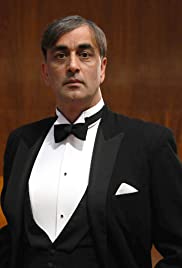
THREE ACT TRAGEDY
UK, 2011, 93 minutes, Colour.
David Suchet, Martin Shaw, Kimberly Nixon, Art Malik, Suzanne Bertish, Anastasia Hille, Ronan Vibert, Kate Ashfield, Jane Asher, Anna Carteret, Tom Wisdom.
Directed by Ashley Pearce.
This is one of the later episodes of the television series with David Suchet as Poirot – over 20 years since the first episode.
There are attractive locations in Cornwall, rather more sinister locations in Yorkshire. The focal character is a distinguished actor, Charles Cartwright, played by Martin Shaw. He is an old friend of Poirot and of Sir Bartholomew Strange, who runs a clinic in Yorkshire. There is a death at the dinner that Poirot attends, the local minister collapsing and dying, the judgement made that it was a natural death, his collapse. However, Charles Cartwright and the young woman that he wants to marry, Egg, think it was murder.
Poirot meets Charles Cartwright on holiday in Monaco and they hear the news that Sir Bartholomew Strange has been killed. They return and begin the investigation, Charles Cartwright assuming the role that Captain Hastings had assisting Poirot in the past, visiting suspects, interviewing them, and with the company of Egg. There is quite a range of suspects.
With some medical information, the death could have been caused in both cases by nicotine poisoning, Poirot changes to the opinion of murder, visits Cornwall and prevents Charles Cartwright’s house manager from destroying his laboratory. There is also a re-enactment where Charles Cartwright collapses, pretending to be murdered.
Everyone is assembled and Poirot explains the ingenious set up for the murders, the minister being a random victim (and Poirot realising that he could have been the victim), with Dr Strange the intended target. Charles Cartwright is the murderer, wanting to marry Egg, but Poirot discovering that he was previously married and his wife was in an institution.
Entertaining and ingenious plotting.
1. The popularity of Agatha Christie mysteries? The television series? David Suchet as Poirot?
2. The setting? Cornwall, the mansion? Yorkshire, the mansion, the Institute? Interiors? Social gatherings? The musical score?
3. The title, the references to the different stages, the murders, the investigations? The theatrical background? Cartwright as actor, celebrated, fans and admirers? The posters?
4. The theatrical style, curtain rising, stage, visual compositions like theatre and performance?
5. Charles Cartwright, on the yacht, in love with Egg? His friendship with Poirot? Longtime? Friendship with Dr Strange since childhood? Gathering people for the dinner? Miss Millray, sitting at table? Charles Cartwright praising and dismissing her?
6. Poirot, at home in this setting, his visit? The introduction to the guests, the range? Fashion designer and husband? The minister and his wife? The playwright? The cocktails? The minister and his collapse and death? The autopsy, coroner’s verdict? Not murder? Poirot believing this and not accepting the opinion of murder?
7. Poirot, visiting Monte Carlo, the meeting with Charles Cartwright? The news of Dr Strange’s death? The return to England?
8. Dr Strange, friendship with Cartwright, buying the mansion, setting up the institution, clients and patients? The invitation to the dinner? The phone call about the new patient arriving? His joking with the butler? The same guests at table? The drinks, Dr Strange and his death?
9. Poirot, Charles Cartwright assisting him with the investigation, assuming the role of Captain Hastings in the past? Egg, her concern, suspicion of murder?
10. The range of visits to the potential suspects? Possible motivations?
11. Poirot and his return to Cornwall, Miss Milray and the laboratory and her attempts to destroy the evidence?
12. Egg, her mother and her presence, Oliver and his attraction towards Egg? Her devotion to Charles Cartwright, the proposal?
13. The gathering, the explanation of what happened? The technique of switching the glasses when the victim collapsed? The nicotine poison, obtaining it, its use, insertion in the cocktails? The minister as being a random victim – and Poirot realising he could been the victim?
14. Charles Cartwright and his denials? The revelation about his wife, in the institution, Dr Strange having that information? His being the target of the murder? The revelation that Cartwright acted the part of the butler? Cartwright wanting to marry Egg, his not wanting to be accused of bigamy?
15. The playwright, her presence, her reaction to the performance of Cartwright pretending to be murdered?
16. An ingenious case? The intricacies of the solution?
Published in Movie Reviews
Published in
Movie Reviews
Saturday, 09 October 2021 13:01
Counterfeiters, The
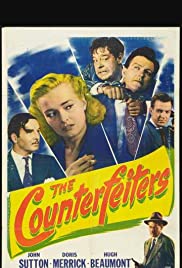
THE COUNTERFEITERS
US, 1948, 73 minutes, Black and white.
John Sutton, Doris Merrick, Hugh Beaumont, Lon Chaney Jr, George O'Hanlon, Gerard Gilbert (Scott Brady)
Directed by Samuel Newfield (as Peter Stewart).
A small-budget supporting feature. Serious intentions, with some comic touches.
It is a film about American counterfeiters, an artist who has produced plates for $20 bills and British 5 pound notes. A businessman in Los Angeles possesses the plates and begins to circulate the forgeries after World War II, especially laundering the notes in Europe. The American T-men are investigating. There is also an Inspector from Scotland Yard.
The action takes place over a few days, the Scotland Yard Inspector (John Sutton) posing as a man interested in the distribution of the counterfeit money, linking up with an American contact on the plane. He is introduced to the man’s girlfriend (whose father is an artist who wants her to come home but she takes a hard line, staying with the criminal). Then, for reasons never explained, there is a Louie, played by Lon Chaney Jr, more or less in the same way that he played George in Of Mice and Men. But, this time, he is not a gentle giant because he can be provoked into violence by the criminals.
The British inspector meets up with his American counterparts, working out strategies, especially when fake notes appear at a racecourse. The Americans do have tabs on Louie and the other criminals. Matters are complicated when the young woman puts her phone number in the coat pocket of the inspector. Also on hand is a comic at a nightclub, Louie staying in his apartment, his wanting to cash in on the counterfeiting but something of a coward.
A lot of plans, Louie being arrested for his violent attack, the inspector going to prison with him to sound him out, a plan for Louie to be released from jail, taken in an ambulance by the police. It does not quite work out that way. There is a confrontation at the home of the owner of the plates, Louie attacking him and his dying of a heart attack. The young woman is involved in all kinds of complexities of emotions and betrayals.
Ultimately, there is a showdown on a boat, the young woman’s father calling the police – with the revelation that his daughter was trying to get the plates in order to save him. Criminals are all rounded up. Leaving the way open for something of an improbable romance.
Published in Movie Reviews
Published in
Movie Reviews
Saturday, 09 October 2021 13:01
Litigante
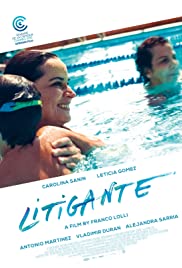
LITIGANTE
Colombia, 2019, 93 minutes, Colour.
Carolina Sanin, Leticia Gomez, Antonio Martinez, Alejandra Sarria, David Roa, Jorge Carreno.
Directed by Franco Lolli.
A film written by women (with French background), about strong women and their interactions, life-and-death situations. This is a serious film. It is also a sombre film in its seriousness – although there are some moments of lightness, touches of humour.
It is also a film from Latin America, from Colombia, set in Bogota. However, as audiences watch the women and their situations, it is really a universal story and could be taking place and any big city around the world. Audiences can identify with the women, although at many moments this is rather difficult, and can appreciate the continued hardships and challenges.
The litigant a of the title is a middle-aged woman, Silvia (a convincing if sometimes alienating performance by Carolina Sanin) – although her litigation is in the background, her profession as a consultant concerning allotting of government contracts, officials finding that some of the business activity contravened the law, her eventually being brought to court. Rather, in the foreground, immediately from the opening sequences of the film, she is in a contentious relationship with her mother. She loves her mother. Her mother loves her. But it is an extraordinarily harsh bickering relationship, mother criticising her daughter continually, daughter trying her best to support her mother prone to outbursts of exasperation.
Her mother, Leticia (Leticia Gomez) is having an MRI. We learn that she has undergone chemotherapy in the past, the doctor advising that her cancer is now terminal, advising more chemotherapy. Many audiences will identify with this central issue of the film: acceptance of terminal cancer, the reluctance to accept the doctor’s verdict by other members of the family, the urging of chemotherapy and the reluctance of the person with the cancer to undergo all the pain and discomfort of the treatment, the loss of quality of life. To that extent, this film is well worth seeing and responding to its dilemmas.
There is also a complication that Silvia is a single mother, Antonio her five-year-old son quite a bright spark, devoted to his mother, loving his grandmother, also his aunt, Silvia’s younger sister, Maria José, who continually helps during her mother’s illness. At home, is a boarder, Sergio, a very sympathetic, a gay man. Silvia is obviously not into relationships but after a hostile interview from the media, she encounters the interviewer at a party, rebukes him but then is attracted and they begin a relationship, he quite a genial and supportive man, she being a mixture of responsive and brittle, treating him very badly.
The film opened Critics Week at Cannes 2019 to favourable reviews but, a number noted that commercially it would be a hard sell. This is true. However, for audiences who want substantial drama, significant personal and family issues, it is well worthwhile.
1. The title? Silvia? Her profession, the court case? Her personal life, the struggles with her mother?
2. A film written by women? Women as the central characters? Strong women? The men, mostly in the background, supporting characters?
3. The city of Bogota, homes, hospital, business, media, the courts? The musical score?
4. The sombre tone of the film, its themes, terminal cancer, chemotherapy and decisions, parents and children, healthcare, single mothers, professional mothers, bringing up children, relationships, business corruption, litigation?
5. The immediate impact, sombre, Silvia with her mother, the doctor and the opinions, cancer, spreading, previous chemotherapy, the MRI? Her mother’s decisions? Silvia and her care, the burdens, the help from her sister?
6. Silvia, her age, character, strong-minded, her relationship with her mother, continued bickering, memories of her father and his death, her mother faithful but hating her husband, wanting her mother to be healed, not listening to her mother’s choices, moving in with her mother, the continued care, shared with her sister? Silvia and her professional life? Her skills, business, government, contracts, her boss, the arguments, her resigning? Taken to court, pleading not guilty? The reliance on her lawyer? Her love for her son, the mystery of his paternity? The meeting with Beniamino, the contract between them, the secrecy, her son asking about his father, her decision to tell him? The interview with Abel, antagonistic, encountering him at the party, the attack, the attraction, dancing, the relationship, his looking after her, her moodiness, the breakoff? Upset at her being ignored at his party? Sergio, gay friend, sharing the apartment, his help with the family?
7. Leticia, her age, her cancer, the MRI, her cantankerous nature, continued criticisms, bickering with her daughter? The doctor and advice, not wanting chemotherapy? Going out with her family, enjoying Antonio’s company, Maria José and her devotion? The continued arguments and criticisms of Silvia? The background of her marriage, cantankerous with her husband, yet staying with him to his death? Her reaction to Abel and disliking him? Liking Sergio? The serious deterioration of her health, her hair being cut, able to eat, unable to eat, taking to her bed, in the corridor and her fall, wetting herself? The pathos of the last encounter with Silvia? The suddenness of her death, stopping breathing?
8. Antonio, his age, a playful little boy, with his single mother, at school, fighting and the discussions with the principal, at home, articulate, his games, the bond with Sergio, with Abel? Questions about his father? His devotion to his grandmother and her care? Devotion to his aunt?
9. Maria José, younger daughter, her life and work, devotion to her mother, helping Silvia? Moments of exasperation? Continued support?
10. Sergio, in the house with Silvia, care, gay man?
11. Abel, journalist, the interview, aggressive criticism of Silvia, the encounter at the party, her cold reaction, the dancing, attraction, starting the relationship? Abel as genial, supporting Silvia? The party, his friends, her feeling ignored, abrupt break up? His continued support, at her mother’s funeral, in the court, driving Silvia and Antonio from the court? The future?
12. Beniamino, older, giving legal advice, the enigmatic aspects of Antonio’s paternity, the secrecy, contract, Silvia wanting to tell her son the truth?
13. Leticia and the deterioration of her health, with the doctor, the chemotherapy and its results, her hair, Maria José cutting her hair, the daughters moving in to look after her, the suddenness of her death? The sadness of her funeral?
14. A portrait of ordinary people, in the city, Columbia, universal story and characters?
Published in Movie Reviews
Published in
Movie Reviews
Saturday, 09 October 2021 13:01
House of Cardin
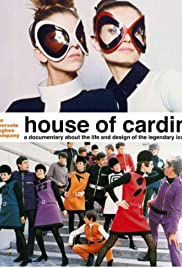
HOUSE OF CARDIN
US/France, 2019, 95 minutes, Colour.
Directed by P.David Ebersole, Todd Hughes.
“A magazine cover reaches millions of people�. A passing remark in this documentary about Pierre Cardin (born in Italy, Pietro Cardine, is family fleeing was Selena’s fascism to France when the boy was two). His career is one of the epitomes of French fashion success, a member of the French Academie. On the day that this reviewer watched this documentary about him, he had turned 98 the day before, July 2nd.
Devotees of fashion have been very well served by feature-length documentaries in recent years, portraits of Christian Dior, Eve St Laurent, Coco Chanel, Vivian Westwood, Alexander McQueen…? This one makes for interesting and arresting viewing.
It is full of energy, continually on the move, images, many images, of clothes and design, models from Europe, the Americas, and, especially Asia and Japan, intercutting the narrative. (There is an enormous credit list at the end, noting the sources of so many of the images of Cardin’s creations.) And, it is not only the dresses and suits, formal and informal (“modern� is mentioned so often), but also the range of furniture, home objects, large and small designs that feature throughout. And, not content with this creativity, Cardin has opened theatres, sponsored festivals, invited all kinds of performers, avant-garde and traditional, Marlene Dietrich, Dionne Warwick, Alice Cooper… And theatrical, ballet and dance events.
We take it for granted when Pierre Cardin explains that his life is work. And, as that is repeated throughout the film, enormous amounts of the evidence is there. He loves to work. In fact, for those who know nothing about him and his life, the would begin to wonder whether he has any private life at all. About 20 minutes before the end of the film, there is some mention about his life, his companionship with actress Jeanne Moreau, his relationship with Andre Oliver, his main assistant for over 40 years. But, that is about all. And, given his work and accomplishment, there would not seem to have been much time for any kind of private life.
And, right throughout the film, there is Cardin himself. Photos of when he was young, working with the Red Cross in Vichy France during the war, coming to Paris in 1945, dress designs for a Jean Cocteau film, encouraged by Dior in 1946, 1950 going out on his own, many images of his shopfronts (and his name in lights, even on the Great Wall of China), film footage of him at work, with models, catwalks… And, then, even more footage and photos of him as he moves towards middle age, more as he moves into late middle age. And, in the decades of video and social media, plenty of footage of him in old age. And, for the film itself, the he is, a powerful and genial presence in his 90s, always involved, commenting on his work, making the audience, even those who know very little of him, pleased to make something of his acquaintance.
Not a biography of the man at all, a portrait. Rather, a biography of his work, his creativity.
Published in Movie Reviews
Published in
Movie Reviews